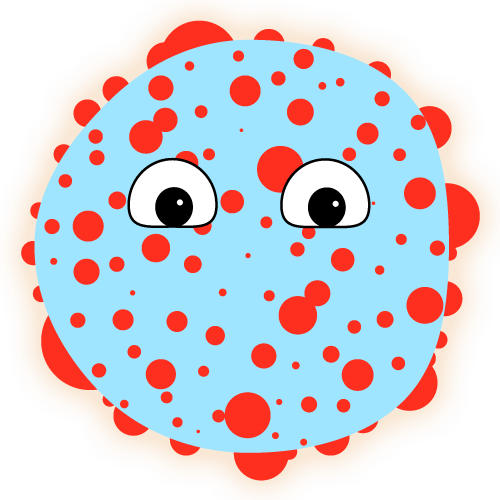
Eww!
Measles
Rubeola
Measles is a virus that begins inside of the body and works its way to the outside. The virus first grows unseen inside the throat and/or lungs.
If you have the following symptoms, you may have measles.
The virus is so tough that if an infected person sneezes measles virus out onto a surface (like a desk or door handle), it can live there for up to 2 hours!
Get vaccinated and always remember to keep your hands clean. Good hand washing means washing your hands for 15 seconds every time.

Yuck!
Rotavirus
Rotavirus Gastroenteritis
Rotavirus is very common—almost everyone has had it by the time they are five years old! It is the leading cause of diarrhea (YUCK!) in children.
If you have the following symptoms, you may have rotavirus:
Rotavirus is very contagious, which means you can catch it really easily. It's seen most often in the winter and spring months, especially in places where there are a lot of kids.
Doctors want babies to get vaccinated for rotavirus, but the best way to keep from catching it is to wash your hands often. Good hand washing means washing for 15 seconds every time.

Oh No!
Meningitis
Meningococcus
Meningitis is an infection caused by two different kinds of germs: a virus or bacteria. It causes the membranes (very thin coverings) of the brain and spinal cord to swell up.
If you have the following symptoms, you may have meningitis:
Sometimes you can also have:
Luckily, meningitis is not as easy to catch as the cold or flu, because it can't spread through air or from touching someone who has it. But it is spread through contact with spit! So don't let anyone sneeze or cough on you, and remember to sneeze into your sleeve, too. Plus, be careful to avoid sloppy kisses!
The Hib vaccine will keep you safe from meningitis. Also, if someone you know has bacterial meningitis you can take antibiotic medication to keep from getting it.

Eww!
Tetanus
Lockjaw
Tetanus is a bacteria that hangs out in places like dirt or soil, and in the bowels (intestines) of animals and people.
If you have severe muscle spasms starting around the neck, chest and back you may have tetanus. If it gets really bad, it can cause such intense stiffness that sometimes infected people cannot open their mouths. That’s why tetanus is also called “lockjaw.”
Tetanus attacks through any break in the skin, like a cut, scrape or burn. (But you can’t catch it from someone else who has it. WHEW!)
The tetanus vaccine (DTaP) is give with two others, diphtheria and pertussis. It’s pretty much 100% effective, and hardly anyone in the U.S. gets tetanus. But don’t forget to get a booster shot every 10 years!
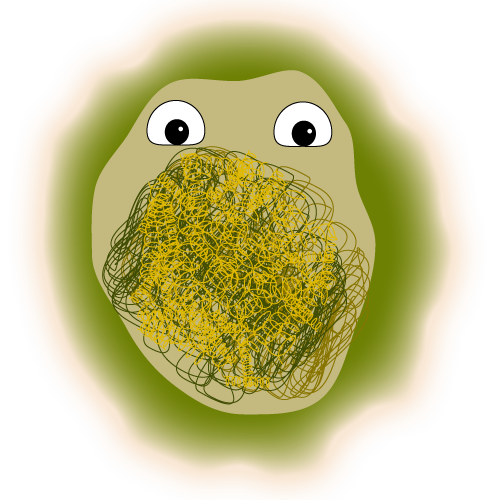
Uggg...
Croup
Laryngotracheobronchitis
Kids with croup usually get it from a virus like the flu. It causes the vocal chords to swell up, and it can make you bark when you cough—like a seal!
It might seem like you only have a small cold for a few days, but then you start barking like a seal.
There are a lot of things that might cause croup, but the most common is a virus.
There’s no vaccine for croup yet, but scientists are working on one! Meanwhile, keep your hands clean and get the flu shot every year.
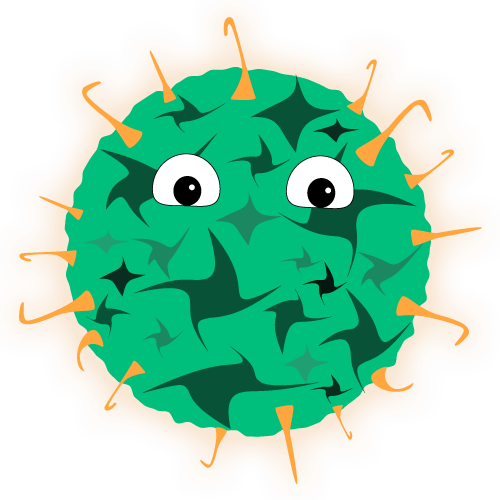
Eww!
Polio
Poliovirus
Polio is a viral infection of the bowel (intestines) that can sometimes make people unable to move parts of their bodies. (But most people don’t even know they have it.) The good news is that polio is pretty much gone from the whole Western Hemisphere thanks to the vaccine!
There are four different kinds of polio:
Polio is spread through contaminated water and accidentally coming in contact with stool (poop!).
Polio was knocked out in the United States in 1979 thanks to the vaccine. But if you have any travel plans to Africa or Asia, double-check that you’ve had your shots!

Nasty!
Influenza
the Flu
That's just a fancy way of saying "the flu." It's caused by a virus, not bacteria.
Sometimes the flu is confused with a common cold. You'll know the difference because it comes on a lot faster and the symptoms are worse. You might have:
Like so many other diseases, flu is spread easily from infected people by sneezing and coughing and through their hands.
You can get a flu shot, but you have to get it every year because there are so many flu viruses. Each year researchers pick the three that are most likely to attack. You can still get the flu even with the shot, but if you do the symptoms won't be so bad and it will go away faster.
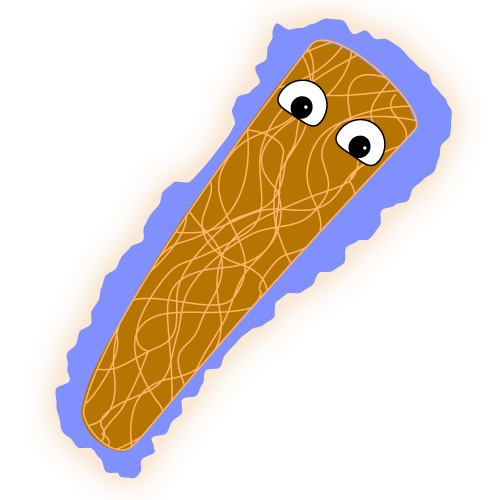
Oh No!
Pertussis
Whooping Cough
Have you ever heard of whooping cough? That's pertussis!
If you have the following symptoms, you may have pertussis.
The bacteria is spread through the air, and is so contagious that a person with pertussis will infect almost everyone in their household if those people aren't vaccinated!
Get vaccinated! Wash your hands with soap, cover up coughs and sneezes, and don't share cups and silverware.

Gross!
Mumps
Epidemic Parotitis
Mumps is a virus that makes the saliva glands between your jaws and ear swell up, giving you "chipmunk cheeks." Some people say the name "mumps" comes from those swollen cheek lumps and the way they make people mumble. So, Mumble + Lumps = Mumps.
If you have the following symptoms, you may have pertussis.
Mumps spreads through the air, and can live on surfaces.
The measles, mumps and rubella vaccine (MMR) has almost gotten rid of mumps in the U.S. In 1967 there were 200,000 or more cases. In 2002 there were only 231! Still, keep up that hand washing and cover up those coughs and sneezes!

Blah!
Varicella
Chicken Pox
The chicken pox! You probably already know it gives you a rash that itches like crazy, and that you can only get it once. But did you know that it's more dangerous if you get it as an adult?
If you have the following symptoms, you may have chicken pox.
Chicken pox is extremely contagious and is spread through the air and lives on surfaces. Also, if you scratch the blisters you will spread the rash.
The vaccine works for most kids (1/4 still get the chicken pox, but if you get the shot and still get the disease it will be a milder case and will go away faster).
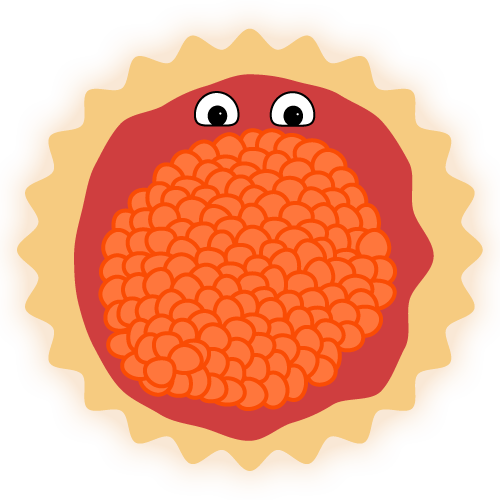
Eww!
Hepatitis
hepatitis
There's a "family" of hepatitis types: Hep A, Hep B, Hep C and Hep D. They all attack the liver, but the worst two are B and C.
Many people with Hep A or B have no symptoms, but the trademark symptom of hepatitis is fatigue, loss of appetite and "jaundice." That's when your skin turns yellow. But Hep B can also be sneaky, and the only way to be sure you have it is with a blood test.
Hepatitis is NOT spread by casual contact. You can only get it through the exchange of bodily fluids—mainly blood.
Vaccines are given for Hep A and Hep B, and the one for B also prevents D. Plus, there's one in the works for Hep C. These shots are the best way to prevent hepatitis.

Oh No!
Diptheria
Corynebacterium diphtheriae
Diphtheria is a bacteria that multiplies in your nose and throat. It builds up and makes it hard to breathe.
The number one sign of diphtheria is a grayish membrane covering the nose and throat. But you might also have:
Diphtheria is another "air and surface" bacteria, and someone who is infected can spread the disease for up to four weeks!
Like tetanus and mumps, the diphtheria vaccine has almost knocked out the disease here in the United States. But you'll probably have to get a booster shot as an adult, because the vaccine's protection fades over time.

Eww!
Rubella
German Measles
Rubella is also called "German measles" and causes a skin rash that starts on the head and spreads down. It's more dangerous for pregnant women, though, as it can hurt the baby.
Rubella symptoms are usually pretty mild, but the rash can last for a couple of weeks.
Rubella is spread through the air, or through close contact with another person.
The MMR (measles/mumps/rubella) vaccine is the best way to prevent it. Luckily, you can only get the infection once!
